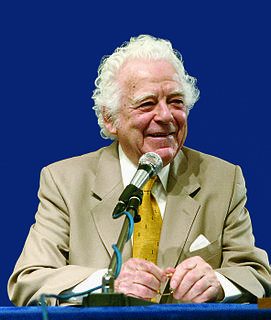A Quote by Chris Jordan
Finding meaning in global mass phenomena can be difficult because the phenomena themselves are invisible, spread across the earth in millions of separate places. There is no Mount Everest of waste that we can make a pilgrimage to and behold the sobering aggregate of our discarded stuff, seeing and feeling it viscerally with our senses.
Related Quotes
We are so far from knowing all the forces of nature and their various modes of action that it would be unworthy of the philosopher to deny phenomena simply because they are inexplicable at the present state of our knowledge. The more difficult it is to acknowledge their existence, the greater the care with which we must study these phenomena.
Our eyes see very little and very badly – so people dreamed up the microscope to let them see invisible phenomena; they invented the telescope...now they have perfected the cinecamera to penetrate more deeply into the visible world, to explore and record visual phenomena so that what is happening now, which will have to be taken account of in the future, is not forgotten.
Our alleged facts might be true in all kinds of ways without contradicting any truth already known. I will dwell now on only one possible line of explanation, - not that I see any way of elucidating all the new phenomena I regard as genuine, but because it seems probable I may shed a light on some of those phenomena. All the phenomena of the universe are presumably in some way continuous; and certain facts, plucked as it were from the very heart of nature, are likely to be of use in our gradual discovery of facts which lie deeper still.
Laplace considers astronomy a science of observation, because we can only observe the movements of the planets; we cannot reach them, indeed, to alter their course and to experiment with them. "On earth," said Laplace, "we make phenomena vary by experiments; in the sky, we carefully define all the phenomena presented to us by celestial motion." Certain physicians call medicine a science of observations, because they wrongly think that experimentation is inapplicable to it.
Our present work sets forth mathematical principles of philosophy. For the basic problem of philosophy seems to be to discover the forces of nature from the phenomena of motions and then to demonstrate the other phenomena from these forces. It is to these ends that the general propositions in books 1 and 2 are directed, while in book 3 our explanation of the system of the world illustrates these propositions.
Everest has a special place in all of our imaginations. For centuries, Everest was a little bit like the moon. It was the place where everyone wanted to go. Empires wanted to be able to say that they were the first to put a climber on top of Everest. So when a tragedy happens up on that mountain, I think it has a global resonance. Everybody's heard of Everest. Everybody knows what Everest is and what it means, and the significance.
The nature of the Absolute is neither perceptible nor imperceptible; and with phenomena it is just the same. But to one who has discovered his real nature, how can there be anywhere or anything separate from it?... ...Therefore it is said: 'The perception of a phenomenon IS the perception of the Universal Nature, since phenomena and Mind are one and the same.'
Communications and commerce are global; investment is mobile; technology is almost magical; and ambition for a better life is now universal. We earn our livelihood in peaceful competition with people all across the earth. Profound and powerful forces are shaking and remaking our world, and the urgent question of our time is whether we can make change our friend and not our enemy.
I don't believe there's anything cosmic or divine or morally superior about whales and dolphins or sharks or trees, but I do think that everything that lives is holy and somehow integrated; and on cloudy days I suspect that these extraordinary phenomena, and the hundreds of tiny, modest versions no one hears about, are an ocean, an earth, a Creator, something shaking us by the collar, demanding our attention, our fear, our vigilance, our respect, our help.
Our design, not respecting arts, but philosophy, and our subject, not manual, but natural powers, we consider chiefly those things which relate to gravity, levity, elastic force, the resistance of fluids, and the like forces, whether attractive or impulsive; and therefore we offer this work as mathematical principles of philosophy; for all the difficulty of philosophy seems to consist in this from the phenomena of motions to investigate the forces of nature, and then from these forces to demonstrate the other phenomena.
We are not built for the mountains and the dawns and aesthetic affinities, those are for moments of inspiration, that is all. We are built for the valley, for the ordinary stuff we are in, and that is where we have to prove our mettle. Spiritual selfishness always wants repeated moments on the mount. We feel we could talk like angels and live like angels, if only we could stay on the mount. The times of exaltation are exceptional, they have their meaning in our life with God, but we must beware lest our spiritual selfishness wants to make them the only time.







































